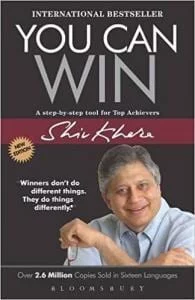You Can Win

ABOUT THE BOOK:
Name: You Can Win: A step by step tool for top achievers
Author: Shiv Khera
Chapter 1: Building a positive attitude
In this chapter author shares a story of a man who sells different color balloons at fair, whenever his business used to go down, in order to tackle that situation he used to fly one balloon in the air, so that when children see that balloon in air, they feel like buying it, with this technique his sales again used to go up, one day when he was selling his balloon one boy came near him and asked him, “IF YOU RELEASE A BLACK BALLOON, WOULD THAT ALSO FLY.” That balloon seller moved by that boy’s concern, for this, that man replied With empathy, ”SON, IT IS NOT THE COLOR OF THE BALLOON, IT IS WHAT IS INSIDE THAT MAKES IT GO UP.”
With this story author want us to know that this man saying applies in our lives as well, It is what is inside that counts, author says that thing inside us what makes us go up is our attitude, author says that have you ever wondered why some people organizations or businesses or countries are more successful than others? Author says the reason for this is very simple, the people who become successful is because they simply think and act of that thinking effectively, author says that one day when he asked a question to two executives that if they would have magic wand what will they ask from that wand, will they ask for profit or huge success or for what, after listening to an answer of those executives he was really very impressed, answer was that people should have better attitude, they will ask for better attitude because better and best attitude can make person a good and successful person.
Author says that people’s attitude contributes to success, as per a study was done by Harvard University, they say 85 percent people get a job because of their attitude, and only 15 percent of people get a job because they are smart or intelligent.
Chapter 2: Acres of Diamonds
In this chapter author had shared a story related to farmer, author says there was a farmer in Africa who was happy and content, that farmer was happy because he was content and he was content because he was happy, one day a wise man came to that farmer and told him about the glory of diamonds and the power that goes along with them, the wise man said that if he had a diamond size of his thumb that he will get his own city and if he would have a diamond size of a fist then he can buy his own country, listening to this that farmer wasn’t able to sleep whole night, he became discontent, and because of this discontent behavior he was unhappy.
The next day immediately after waking up, that farmer left his family and sold his entire farm and moved out in search of diamond, after searching whole Africa he didn’t found anything and when he returned to his home place he was financially destroyed and also lost his whole happiness, he started feeling unhappy and lost, so finally he committed suicide.
The person who bought first farmer farm was watering the camels at a stream, when he was working on that land he found some shining stone, he took that stone and kept it at his home, when wise man came to meet first farmer, he saw that stone, that wise man asked the new owner is the earlier farmer has come home? For this new owner replies no but why you asking this, for this that wise man says that I can see the diamond which I have asked him to search, for this new owner says no its not a diamond but a normal shining stone , and my entire farm which I have bought from earlier farmer is filled with such shining stone, when that farmer took that wise man to his farm, he told him that these are diamonds not stone, after analyzing that farm properly they came to know that farm was covered with wcres and acres of diamonds.
After sharing this story author ask us to find 5 morals of this story
So let’s discuss the morals as per author
- When our attitude is right, we realize that we are all walking on acres and acres of diamonds.
- The grass on the other side always looks greener
- Author says that every person in this world like grass on the other side, means when you like someone else’s grass then someone else also likes some other persons grass.
- Author says that when person don’t know how to recognize opportunity, they complain of noise when it knocks.
- The same opportunity never knocks twice, the next opportunity can be better or worse but it can never be the same.
Chapter 3: Factors that determine our attitude
Author says primarily factors that determine our attitude:
- Environment
- Experience
- Education
Under Environment comes home, school, work, media, culture, Religion, tradition, Social environment and political environment.
Experience
Author says our behavior changes according to our experience with people and events in our lives, if we have positive experience with people then our attitude also becomes positive.
Education
Here author talks about formal and informal education, here author is not only talking about academic qualifications or degrees, here author is talking about knowledge which gives wisdom and ensures success.
This is the short summary of You Can Win.
Thankyou



